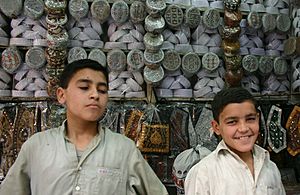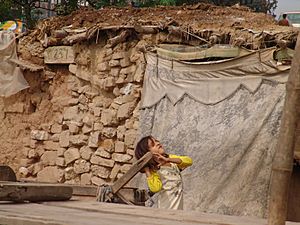Child labour in Pakistan facts for kids
Child labor is a big problem in Pakistan. It means children are made to work instead of going to school or playing. In the 1990s, experts thought about 11 million children were working there. Half of these kids were even younger than ten years old.
Why Child Labor Happens
Experts like the International Labour Organisation (ILO) say that poverty is the main reason for child labor. Poverty means not having enough money for basic needs. In Pakistan, the average income for each person is quite low. Many families have a lot of people to feed with very little money.
Because of this, some families feel they need their children to work. This extra money helps the family afford food and other important things.
Laws Against Child Labor
The government of Pakistan has made several laws to stop child labor. These laws also try to make sure that young workers have safe conditions. Some of the important laws include:
- The Factories Act 1934
- The West Pakistan Shops and Establishments Ordinance 1969
- The Employment of Children Act 1991
- The Bonded Labour System Abolition Act 1992
- The Punjab Compulsory Education Act 1994
Even with these laws, child labor is still a big challenge in Pakistan. Many of these rules are not always followed. Millions of children, some as young as four, still work in factories. Often, they work in very difficult and unsafe places.
In 2014, the U.S. Department of Labor listed several products made in Pakistan using child labor. These included bricks, carpets, glass bangles, leather, and surgical tools. Children were also found working in coal mines.
Helping to Stop Child Labor
Many groups are working to end child labor in Pakistan. These groups, called NGOs (Non-Governmental Organizations), help people understand the problem. They also try to protect children from being forced to work.
Some factories are now part of special programs. These programs offer free schools for the children of workers. They also provide free hospital care for families. These efforts aim to give children a better future away from work.



